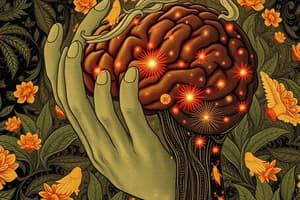Podcast
Questions and Answers
What is the primary function of sensory memory?
What is the primary function of sensory memory?
- To allow initial processing of sensory input. (correct)
- To encode information deeply.
- To store information for years.
- To recall information after long intervals.
Which memory system is described as lasting only a fraction of a second?
Which memory system is described as lasting only a fraction of a second?
- Long-term memory
- Iconic memory (correct)
- Working memory
- Short-term memory
According to the Levels-of-Processing Model, which aspect significantly affects memory retention?
According to the Levels-of-Processing Model, which aspect significantly affects memory retention?
- Depth of processing information (correct)
- The duration of sensory memory
- Automatic processing of sensory input
- The type of sensory information presented
Which model helps to explain how memory functions simultaneously and connections in the brain are made?
Which model helps to explain how memory functions simultaneously and connections in the brain are made?
What does the Information-Processing Model primarily provide?
What does the Information-Processing Model primarily provide?
What is NOT a characteristic of sensory memory?
What is NOT a characteristic of sensory memory?
How does thinking about the meaning of information impact retention according to the provided models?
How does thinking about the meaning of information impact retention according to the provided models?
Which memory model suggests that different models can be viewed as complementary rather than conflicting?
Which memory model suggests that different models can be viewed as complementary rather than conflicting?
What type of memory is likely to be retained because it holds significant importance to the individual?
What type of memory is likely to be retained because it holds significant importance to the individual?
Which law states that we are more likely to remember experiences that occur frequently?
Which law states that we are more likely to remember experiences that occur frequently?
What effect refers to our tendency to remember the first encounter with someone better than subsequent meetings?
What effect refers to our tendency to remember the first encounter with someone better than subsequent meetings?
Which model of memory suggests that memory operates as interconnected mental networks?
Which model of memory suggests that memory operates as interconnected mental networks?
Which type of amnesia affects the ability to recall events that occurred after the onset of the condition?
Which type of amnesia affects the ability to recall events that occurred after the onset of the condition?
What plays a crucial role in the consolidation and retrieval of memories?
What plays a crucial role in the consolidation and retrieval of memories?
Which process refers to the brain's ability to reorganize itself by forming new neural connections?
Which process refers to the brain's ability to reorganize itself by forming new neural connections?
What is believed to be necessary for long-term memory retention, involving changes at the synaptic level?
What is believed to be necessary for long-term memory retention, involving changes at the synaptic level?
What is the primary function of short-term memory?
What is the primary function of short-term memory?
Which process involves converting sensory information into a usable form for the brain?
Which process involves converting sensory information into a usable form for the brain?
What is the role of retrieval in memory?
What is the role of retrieval in memory?
How long can long-term memory potentially retain information?
How long can long-term memory potentially retain information?
What is the key function of the hippocampus in memory?
What is the key function of the hippocampus in memory?
What is neuroplasticity in the context of memory?
What is neuroplasticity in the context of memory?
What type of amnesia involves the inability to form new memories after a trauma?
What type of amnesia involves the inability to form new memories after a trauma?
Which of the following statements about memory storage is true?
Which of the following statements about memory storage is true?
Flashcards
Law of Recency
Law of Recency
We remember things that happened recently better than those that happened long ago.
Law of Frequency
Law of Frequency
We remember things more often experienced/repeated more frequently.
Law of Primacy
Law of Primacy
We tend to remember the first things we encounter better than those encountered later.
Flashbulb Memory
Flashbulb Memory
Signup and view all the flashcards
Autobiographical Memory
Autobiographical Memory
Signup and view all the flashcards
Maintenance Rehearsal
Maintenance Rehearsal
Signup and view all the flashcards
Information-Processing Model
Information-Processing Model
Signup and view all the flashcards
Encoding, Storage, Retrieval
Encoding, Storage, Retrieval
Signup and view all the flashcards
What is memory?
What is memory?
Signup and view all the flashcards
Encoding: Putting it in
Encoding: Putting it in
Signup and view all the flashcards
Storage: Keeping it in
Storage: Keeping it in
Signup and view all the flashcards
Retrieval: Getting it out
Retrieval: Getting it out
Signup and view all the flashcards
Sensory information
Sensory information
Signup and view all the flashcards
Short-term memory
Short-term memory
Signup and view all the flashcards
Long-term memory
Long-term memory
Signup and view all the flashcards
What are the three processes of memory?
What are the three processes of memory?
Signup and view all the flashcards
Parallel Distributed Processing (PDP) Model
Parallel Distributed Processing (PDP) Model
Signup and view all the flashcards
Depth of Processing
Depth of Processing
Signup and view all the flashcards
Sensory Memory (SM)
Sensory Memory (SM)
Signup and view all the flashcards
Iconic Memory
Iconic Memory
Signup and view all the flashcards
Levels-of-Processing Model
Levels-of-Processing Model
Signup and view all the flashcards
How do the models complement each other?
How do the models complement each other?
Signup and view all the flashcards
What is the key takeaway for improving memory?
What is the key takeaway for improving memory?
Signup and view all the flashcards
Study Notes
What is Memory?
- Memory is an active system that receives information from the senses, processes it, stores it, and retrieves it.
- Memory involves three key processes: encoding, storage, and retrieval.
Putting It In: Encoding
- Encoding is the process of converting sensory information into a usable form for the brain.
- This involves mental operations to transform sensory data (sight, sound, etc.) into a format that the brain can use.
Keeping It In: Storage
- Storage is holding onto information for a period of time.
- The duration of storage varies, depending on the memory system (short-term memory lasts seconds/minutes, long-term memory potentially lasts a lifetime).
Getting It Out: Retrieval
- Retrieval is accessing stored information when needed.
- Retrieval can be challenging and may be affected by factors like stress or distractions.
Nature of Memory
- Similar ideas are easier to remember.
- Opposite ideas are easier to remember (e.g. black and white).
- Unrelated ideas are more difficult to remember.
- Favorable/positive events are easier to remember.
- Traumatic/unfavorable events are readily remembered.
- Information of interest stands out from information that is not significant for a person.
Laws of Memory
- Law of Recency: Easier to remember things that recently happened than things in the distant past.
- Law of Primacy: Easier to remember things that happened first than things that happened later.
- Law of Vividness: Striking or memorable events are easier to recall than ordinary events.
Models of Memory
- Multiple models are needed to explain how information is stored, processed, and retrieved.
Information-Processing Model
- Compares the mind to a computer with stages of encoding, storage, and retrieval.
- Encoding: transforming information from the environment into mental representations
- Storage: retaining information in the brain
- Retrieval: accessing stored information.
Parallel Distributed Processing (PDP) Model
- Suggests memory functions like a web of interconnected networks rather than a series of isolated stages.
- Information is processed across multiple areas of the brain simultaneously.
Levels-of-Processing Model
- Memory retention depends on how deeply information is processed.
- Deeper processing leads to longer-lasting memories.
Sensory Memory (SM)
- The initial stage of memory where sensory information enters the nervous system.
- Information is held briefly (≤ 0.5 seconds).
- Iconic Memory (visual) and echoic memory (auditory) are types of sensory memory.
Short-Term Memory (STM)
- Holds information for up to 30 seconds or more.
- Selective attention filters information from sensory memory and allows it to enter short-term memory.
- Broadbent's filter theory: information is filtered at an early stage based on basic sensory properties.
- Treisman's attenuation theory: filtering happens in two stages. The first based on physical features, then by importance.
Working Memory
- An active processing system that manipulates and stores information held in STM.
- It is crucial for complex cognitive tasks like reasoning, comprehension, language, and problem-solving.
- The central executive is a key part of working memory, coordinating information processing.
Long-Term Memory (LTM)
- Long-term memory (LTM) is a system that stores information for extended periods.
- It holds a vast amount of information, including memories of facts, experiences, and skills.
Encoding Information into LTM
- Maintenance Rehearsal: Repeating information.
- Elaborative Rehearsal: Making information meaningful by connecting it to existing knowledge
Types of Long-Term Memory
- Nondeclarative (Implicit) Memory: Includes skills, habits, and conditioned reflexes (unconscious).
- Declarative (Explicit) Memory: Includes semantic memory (general knowledge) and episodic memory (personal experiences).
Retrieval of Long-Term Memory
- Retrieval cues: hints that help access stored information.
- Encoding specificity: memory retrieval is better when the context at retrieval is similar to the context at encoding.
Constructive Processing of Memories
- Memories are not simply retrieved but "rebuilt" each time they are accessed.
- New information can alter or fill in missing details of a memory.
Forgetting
- Encoding failure, decay, and interference contribute to forgetting.
- Encoding failure: information fails to make it into long-term memory.
- Trace decay: a memory weakens with time.
- Interference: other memories interfere with the retrieval of a target memory.
Memory Retrieval Problems
- Misinformation effect: a memory is altered by misleading information.
- False-memory syndrome: creation of a false memory often due to suggestive cues.
Classic Studies in Psychology
- Loftus's research on eyewitness testimony reveals the reconstructive nature of memory.
- Memories can be influenced by post-event information.
Sleep and Memory Consolidation
- Sleep plays a significant role in consolidating memories.
- During sleep, memories are reinforced and strengthened.
- Selective rehearsal during sleep: improving memory of important information
Automatic Encoding
- Flashbulb memories are vivid memories of emotionally significant events.
- These memories can be less accurate over time.
Exercise and Memory
- Exercise can improve various aspects of memory functioning, including recall.
DHA-rich Diet
- DHA is a type of fatty acid that can positively impact memory health.
Implications of Working Memory for Learning and Intelligence
- Working memory plays a role in various cognitive functions and learning tasks.
Infantile Amnesia
- The inability to recall early childhood memories.
- Possible causes linked to the development of language and autobiographical memory.
Memory and the Brain
- The hippocampus plays a critical role in forming long-term memories.
- Different parts of the brain are responsible for various types of memories.
Memory and Emotions
- Emotions can influence memory formation and retrieval.
- Memories associated with strong emotions tend to be better remembered.
Memory and Aging
- Memory tends to decline with age, particularly episodic memory.
Studying That Suits You
Use AI to generate personalized quizzes and flashcards to suit your learning preferences.



